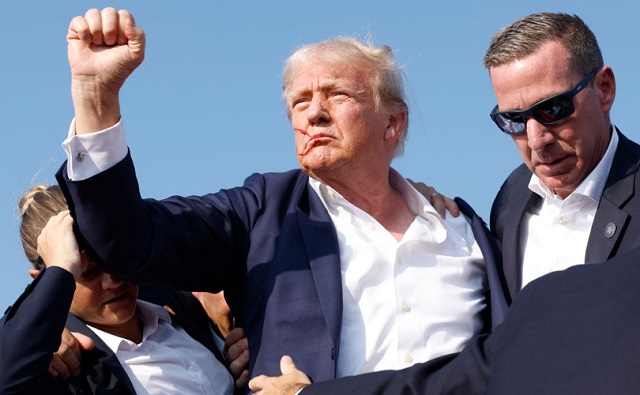International
Trump reacts to assassination attempt: Bullet ‘pierced the upper part of my right ear’

Republican presidential candidate former President Donald Trump is rushed offstage during a rally on July 13, 2024 in Butler, Pennsylvania
From LifeSiteNews
‘I knew immediately that something was wrong in that I heard a whizzing sound, shots, and immediately felt the bullet ripping through the skin.’
The bullet that was fired at former President Donald Trump at a rally tonight “pierced” the upper part of his right ear, he wrote on Truth Social in his first public statement since the assassination attempt.
“I was shot with a bullet that pierced the upper part of my right ear,” the former president wrote. “I knew immediately that something was wrong in that I heard a whizzing sound, shots, and immediately felt the bullet ripping through the skin. Much bleeding took place, so I realized then what was happening. GOD BLESS AMERICA!”

“Nothing is known at this time about the shooter, who is now dead,” Trump wrote. The Washington Post reported that in addition to the shooter, a rally attendee is confirmed dead and two other people are “critically injured.” The nephew of Rep. Ronny Jackson (R-TX) is one of the people who was shot, the congressman told Fox News.
“A source familiar with Trump’s security detail” told The Federalist‘s Sean Davis “that the former and future president’s detail has been asking for beefed up protection and resources for weeks, but has been rebuffed time and again by Biden’s DHS,” Davis tweeted.
An eyewitness told the BBC that he warned the Secret Service after he saw an individual climbing a nearby roof with a gun.
The head of the Secret Service and the leader of this security detail should resign https://t.co/ihlEC5NP1w
— Elon Musk (@elonmusk) July 14, 2024
🚨🇺🇸#BREAKING: NEW footage shows the crowd spotting the shooter BEFORE secret service take action.
“HE'S GOT A GUN!” multiple people yell.
Wow… pic.twitter.com/3vgxPZD6fV
— Censored Men (@CensoredMen) July 14, 2024
A roof with a direct sightline to the stage was not secured by secret service. Our choices here are extreme unbelievable negligence or something much worse. https://t.co/4WcIuLcr3H
— Matt Walsh (@MattWalshBlog) July 13, 2024
UNREAL photo by @dougmillsnyt. You can see the bullet flying by Trump’s head. pic.twitter.com/wSk9oPx1wi
— Caleb Hull (@CalebJHull) July 14, 2024
Senator Mike Lee (R-UT) and Ambassador Robert O’Brien, former U.S. National Security Advisor, issued a joint statement calling for the “political temperature” to be taken down and federal and state criminal charges against the former president to be dropped.
Speaker of the House Mike Johnson announced in an X post that the chamber “will conduct a full investigation of the tragic events today.”
“The American people deserve to know the truth. We will have Secret Service Director Kimberly Cheatle and other appropriate officials from DHS and the FBI appear for a hearing before our committees ASAP,” Johnson wrote.
It appears an American lost their life tonight because he cared about the political process in this country. If you’re worried about the demise of democracy, it’s this.
— Beverly Hallberg (@BeverlyHallberg) July 14, 2024
Now is the time for every American who loves our country to step back from the division, renounce all violence, and unite in prayer for President Trump and his family.
— Robert F. Kennedy Jr (@RobertKennedyJr) July 13, 2024
Former senior federal law enforcement source tells Fox: “Secret service failed. Shooter was high ground, took way too long to get him out and he was exposed if there was a second shooter. That was an inch away from his assassination.”
— Jacqui Heinrich (@JacquiHeinrich) July 14, 2024
Extreme incompetence or it was deliberate. Either way, the SS leadership must resign. https://t.co/0vYGrj6yuH
— Elon Musk (@elonmusk) July 14, 2024
Crime
The Uncomfortable Demographics of Islamist Bloodshed—and Why “Islamophobia” Deflection Increases the Threat


Addressing realities directly is the only path toward protecting communities, confronting extremism, and preventing further loss of life, Canadian national security expert argues.
After attacks by Islamic extremists, a familiar pattern follows. Debate erupts. Commentary and interviews flood the media. Op-eds, narratives, talking points, and competing interpretations proliferate in the immediate aftermath of bloodshed. The brief interval since the Bondi beach attack is no exception.
Many of these responses condemn the violence and call for solidarity between Muslims and non-Muslims, as well as for broader societal unity. Their core message is commendable, and I support it: extremist violence is horrific, societies must stand united, and communities most commonly targeted by Islamic extremists—Jews, Christians, non-Muslim minorities, and moderate Muslims—deserve to live in safety and be protected.
Yet many of these info-space engagements miss the mark or cater to a narrow audience of wonks. A recurring concern is that, at some point, many of these engagements suggest, infer, or outright insinuate that non-Muslims, or predominantly non-Muslim societies, are somehow expected or obligated to interpret these attacks through an Islamic or Muslim-impact lens. This framing is frequently reinforced by a familiar “not a true Muslim” narrative regarding the perpetrators, alongside warnings about the risks of Islamophobia.
These misaligned expectations collide with a number of uncomfortable but unavoidable truths. Extremist groups such as ISIS, Al-Qaeda, Hamas, Hezbollah, and decentralized attackers with no formal affiliations have repeatedly and explicitly justified their violence through interpretations of Islamic texts and Islamic history. While most Muslims reject these interpretations, it remains equally true that large, dynamic groups of Muslims worldwide do not—and that these groups are well prepared to, and regularly do, use violence to advance their version of Islam.
Islamic extremist movements do not, and did not, emerge in a vacuum. They draw from the broader Islamic context. This fact is observable, persistent, and cannot be wished or washed away, no matter how hard some may try or many may wish otherwise.
Given this reality, it follows that for most non-Muslims—many of whom do not have detailed knowledge of Islam, its internal theological debates, historical divisions, or political evolution—and for a considerable number of Muslims as well, Islamic extremist violence is perceived as connected to Islam as it manifests globally. This perception persists regardless of nuance, disclaimers, or internal distinctions within the faith and among its followers.
THE COST OF DENIAL AND DEFLECTION
Denying or deflecting from these observable connections prevents society from addressing the central issues following an Islamic extremist attack in a Western country: the fatalities and injuries, how the violence is perceived and experienced by surviving victims, how it is experienced and understood by the majority non-Muslim population, how it is interpreted by non-Muslim governments responsible for public safety, and how it is received by allied nations. Worse, refusing to confront these difficult truths—or branding legitimate concerns as Islamophobia—creates a vacuum, one readily filled by extremist voices and adversarial actors eager to poison and pollute the discussion.
Following such attacks, in addition to thinking first of the direct victims, I sympathize with my Muslim family, friends, colleagues, moderate Muslims worldwide, and Muslim victims of Islamic extremism, particularly given that anti-Muslim bigotry is a real problem they face. For Muslim victims of Islamic extremism, that bigotry constitutes a second blow they must endure. Personal sympathy, however, does not translate into an obligation to center Muslim communal concerns when they were not the targets of the attack. Nor does it impose a public obligation or override how societies can, do, or should process and respond to violence directed at them by Islamic extremists.
As it applies to the general public in Western nations, the principle is simple: there should be no expectation that non-Muslims consider Islam, inter-Islamic identity conflicts, internal theological disputes, or the broader impact on the global Muslim community, when responding to attacks carried out by Islamic extremists. That is, unless Muslims were the victims, in which case some consideration is appropriate.
Quite bluntly, non-Muslims are not required to do so and are entitled to reject and push back against any suggestion that they must or should. Pointedly, they are not Muslims, a fact far too many now seem to overlook.
The arguments presented here will be uncomfortable for many and will likely provoke polarizing discussion. Nonetheless, they articulate an important, human-centered position regarding how Islamic extremist attacks in Western nations are commonly interpreted and understood by non-Muslim majority populations.
Non-Muslims are free to give no consideration to Muslim interests at any time, particularly following an Islamic extremist attack against non-Muslims in a non-Muslim country. The sole exception is that governments retain an obligation to ensure the safety and protection of their Muslim citizens, who face real and heightened threats during these periods. This does not suggest that non-Muslims cannot consider Muslim community members; it simply affirms that they are under no obligation to do so.
The impulse for Muslims to distance moderate Muslims and Islam from extremist attacks—such as the targeting of Jews in Australia or foiled Christmas market plots in Poland and Germany—is understandable.
Muslims do so to protect their own interests, the interests of fellow Muslims, and the reputation of Islam itself. Yet this impulse frequently collapses into the “No True Scotsman” fallacy, pointing to peaceful Muslims as the baseline while asserting that the attackers were not “true Muslims.”
Such claims oversimplify the reality of Islam as it manifests globally and fail to address the legitimate political and social consequences that follow Islamic extremist attacks in predominantly non-Muslim Western societies. These deflections frequently produce unintended effects, such as strengthening anti-Muslim extremist sentiments and movements and undermining efforts to diminish them.
The central issue for public discourse after an Islamic extremist attack is not debating whether the perpetrators were “true” or “false” Muslims, nor assessing downstream impacts on Muslim communities—unless they were the targets.
It is a societal effort to understand why radical ideologies continue to emerge from varying—yet often overlapping—interpretations of Islam, how political struggles within the Muslim world contribute to these ideologies, and how non-Muslim-majority Western countries can realistically and effectively confront and mitigate threats related to Islamic extremism before the next attack occurs and more non-Muslim and Muslim lives are lost.
Addressing these realities directly is the only path toward protecting communities, confronting extremism, and preventing further loss of life.
Ian Bradbury, a global security specialist with over 25 years experience, transitioned from Defence and NatSec roles to found Terra Nova Strategic Management (2009) and 1NAEF (2014). A TEDx, UN, NATO, and Parliament speaker, he focuses on terrorism, hybrid warfare, conflict aid, stability operations, and geo-strategy.
The Bureau is a reader-supported publication.
To receive new posts and support my work, consider becoming a free or paid subscriber.
International
Bondi Beach Shows Why Self-Defense Is a Vital Right

By
Individuals and communities must take responsibility for their own safety.
|
||||||||||||||||||||||||||||||||||||||||||||||||||
|
|
||||||||||||||||||||||||||||||||||||||||||||||||||
|
||||||||||||||||||||||||||||||||||||||||||||||||||
|
||||||||||||||||||||||||||||||||||||||||||||||||||
|
||||||||||||||||||||||||||||||||||||||||||||||||||
|
||||||||||||||||||||||||||||||||||||||||||||||||||
|
||||||||||||||||||||||||||||||||||||||||||||||||||
|
||||||||||||||||||||||||||||||||||||||||||||||||||
|
||||||||||||||||||||||||||||||||||||||||||||||||||
|
||||||||||||||||||||||||||||||||||||||||||||||||||
|
||||||||||||||||||||||||||||||||||||||||||||||||||
|
||||||||||||||||||||||||||||||||||||||||||||||||||
-

 Digital ID2 days ago
Digital ID2 days agoCanada releases new digital ID app for personal documents despite privacy concerns
-

 Energy2 days ago
Energy2 days agoCanada’s sudden rediscovery of energy ambition has been greeted with a familiar charge: hypocrisy
-

 Daily Caller20 hours ago
Daily Caller20 hours agoParis Climate Deal Now Decade-Old Disaster
-

 Business10 hours ago
Business10 hours agoOttawa Pretends To Pivot But Keeps Spending Like Trudeau
-

 armed forces1 day ago
armed forces1 day agoOttawa’s Newly Released Defence Plan Crosses a Dangerous Line
-

 Energy10 hours ago
Energy10 hours agoLiberals Twisted Themselves Into Pretzels Over Their Own Pipeline MOU
-

 Censorship Industrial Complex7 hours ago
Censorship Industrial Complex7 hours agoHow Wikipedia Got Captured: Leftist Editors & Foreign Influence On Internet’s Biggest Source of Info
-

 Bruce Dowbiggin2 days ago
Bruce Dowbiggin2 days agoNFL Ice Bowls Turn Down The Thermostat on Climate Change Hysteria











